It’s been a frightening year for environmentalists, wildlife protectors and conservationists. Progress made in reducing harmful greenhouse gas emissions backtracked when climate change deniers hamstrung the Environmental Protection Agency.
The Dakota and Keystone pipeline proposals were fast-tracked and public lands sold to the highest bidder in the energy industry, risking national monuments and critical wildlife migration corridors, including Bears Ears and Grand Staircase-Escalante.
Humans have caused irreversible changes and lasting damage to the environment. We’re also the only species to name ourselves “the wise one,” Homo sapiens. How wise are we? We’ve created a culture that is not sustainable.
The evidence linking human activity to climate change is clear, but as with any strong addiction, many are in denial.
We’re beyond the threat of climate change. It’s already happening. According to the National Oceanic and Atmospheric Association, the oldest and thickest ice in the Arctic has declined by 95 percent. Life on Earth is in the grips of the sixth mass extinction, species we never even knew are now extinct.
Mainland avian extinctions are on the rise and almost always linked to habitat destruction due to human activity.
Remember the blue bird Rio in the 2011 animated film about a captive Macaw who travels to Brazil to find Jewel, the last known member of the species? The Spix’s Macaw, Cyanopsitta spixii, is now extinct in the wild.
According to a new study by Birdlife International, deforestation in South America to satisfy the needs of large-scale agriculture and industrial activities destroyed its habitat.
We can’t change the past, but here’s the silver lining, we can today choose to be part of the solution, not the problem. Everything you do matters. Every thought counts. Everything you consume makes a difference. Take sustainable action with mindful consumerism. What can you do to show you care for life? Refuse and reduce use of non-sustainable products, choose biodegradable options and renewable energy.
People can feel overwhelmed by the enormity of the task at hand. Alarming scientific predictions can cause fear and anxiety, leading to apathy, depression and even worse, denial.
For a sustainable movement, we need to utilize the positive energy of courage, care and concern. We must not get lost in criticism, cynicism, and/or ‘doom and gloom’ speculations.
For me, curiosity and humor are key when developing new habits, as well as remembering why I care. I care for life. Do you?
You don’t have to save the world single-handedly. You can join the movement. Movements change the way we think and lead to a more evolved social norm.
Smoking in restaurants is a good example of what once was thought of as normal, but is now, gladly, a thing of the past.
Find joy in the small changes you make, celebrate these small victories, spiral up and outwards towards wholesomeness. That’s how consciousness shifts. Heavy energies sink you into despair and depression. Lightness of being elevates you up and out.
Martin Luther King knew this and he insisted on reaching for the light when fighting the good fight. “Darkness cannot drive out darkness; only light can do that.”
Review your daily habits and choose one thing at a time.
Refusing single-use plastics is a great way to start.
In my household, we replaced plastic bottles of soap, shampoo and conditioners with cruelty-free, all natural and biodegradable bars. We stopped using plastic bags, balloons, straws and Styrofoam products.
“Before we click and buy”, we “give Port a try.” The (now vacant) Main Street movie theater in Port Washington appropriately features this well-formulated slogan, a sign of the times we live in. Shop local.
Support the National Audubon society and donate to conservation http://gifts.audubon.org/adoption-center. Other great charities are The Nature Conservancy https://www.nature.org/en-us/ and World Wildlife Fund https://www.worldwildlife.org
Earth care is self-care, nature is written in your DNA. When we treat the environment with care and concern, we’re respecting ourselves, each other and future generations.
A highly recommended read is ‘Drawdown: The most comprehensive plan ever proposed to reverse global warming’ by Paul Hawken. It’s an uplifting manual proposing an action plan for an enlightened society in recovery from climate change denial. Breakthrough your personal denial, address the issues you care about.
On behalf of life, I wish you a restorative and sustainable season of joy.
May the words of Aldo Leopold, the father of wildlife management, bring forth the care and concern in you: “Wilderness is a resource which can shrink but not grow. Invasions can be arrested or modified in a manner to keep an area usable either for recreation, or for science, or for wildlife, but the creation of new wilderness in the full sense of the word is impossible” -Aldo Leopold
Refuse, reduce, repair and restore!
Dr. Hildur Palsdottir
Port Washington



